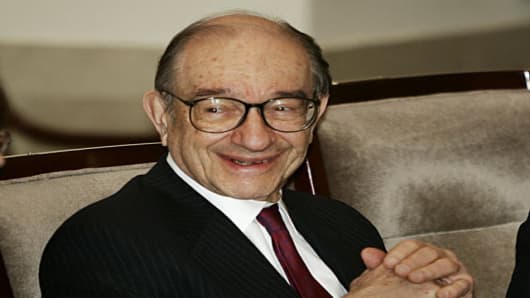
J. Scott Applewhite
On his last day as chairman of the Board of Governors of the Federal Reserve System, Alan Greenspan smiles as he presides over his final Federal Open Market Committee meeting at the the Fed's headquarters in Washington, Tuesday, Jan. 31, 2006. He is speaking to Deborah J. Danker, at left, special assistant to the board, with Vice Chairman Roger W. Ferguson Jr., at right. Greenspan has held the post for more than 18 years and is widely viewed as the most successful chairman in the Fed's 92-year h
And with inflation on the rise, investors can't necessarily count on the Fed to cut interest rates further.
The Fed's decision last week to cut rates only a quarter pointdisappointed the markets, yet higher-than-expected gains in wholesale and consumer prices reported late last week supported the Fed's view that inflation remained a problem.
Higher inflation is also a problem for consumers, whom retailers rely on during the holidays to fuel their profits. Sales data has suggested tepid spending by Americans, who are struggling with higher food and energy costs and tumbling home values.
"The consumer is two-thirds of our economy. The consumer holds the key to whether we have a recession in 2008," said Alfred E. Goldman, chief market strategist at A.G. Edwards.
Yet in one positive sign, the latest CNBC Holiday Central Survey found that Americans were ready to increase their holiday spendingdespite the downbeat outlook on housing and the economy.
Meanwhile, a Fed economist said that the economy faces a heightened risk of recession.
"There appears to be a significant chance of registering at least one quarter of negative GDP growth, which in the past has often been associated with a recession," Glenn Rudebusch,
associate director of research, said in the San Francisco Fed's latest "FedViews" newsletter. "All in all, we foresee anemic growth through the spring of next year."
Even President Bush, while saying the fundamentals of the U.S. economy remained strong, warned on Monday that "storm clouds" are looming.
"This economy's pretty good," Bush told a Rotary Club audience in Fredericksburg, Virginia. "There's definitely some storm clouds and concerns but the underpinning is good."
In economic data, the U.S. government said the current account deficit, the broadest measure of international trade, narrowed in the third quarter compared to the second quarter, as expected, to the lowest level in two years.
Meanwhile, the New York Fed's Empire State Manufacturing Index fellmore sharply in December than economists anticipated.
And U.S. homebuilder sentiment remained at a record lowfor a third consecutive month in December, weighed down by problems in the mortgage market and a huge supply of unsold houses, an industry group said on Monday.
Investors, meanwhile, are skeptical that a special Federal Reserve credit auction announced last week will do much to solve the global credit crunch.
The Fed is offering $20 billion in 28-day credit through an auction Monday. The central bank will not release the results until Wednesday, but the aim of the auction is to encourage commercial banks to borrow from the central bank. That, in turn, would boost banks' lending to businesses and consumers and keep the economy humming.


